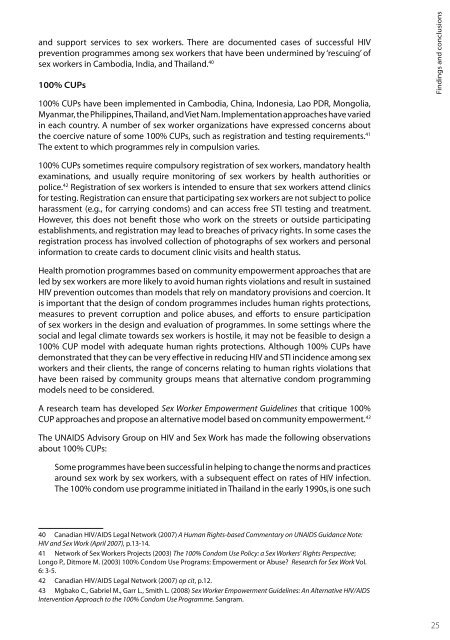SEX WORK AND THE LAW - HIV/AIDS Data Hub
SEX WORK AND THE LAW - HIV/AIDS Data Hub
SEX WORK AND THE LAW - HIV/AIDS Data Hub
Create successful ePaper yourself
Turn your PDF publications into a flip-book with our unique Google optimized e-Paper software.
and support services to sex workers. There are documented cases of successful <strong>HIV</strong><br />
prevention programmes among sex workers that have been undermined by ‘rescuing’ of<br />
sex workers in Cambodia, India, and Thailand. 40<br />
100% CUPs<br />
100% CUPs have been implemented in Cambodia, China, Indonesia, Lao PDR, Mongolia,<br />
Myanmar, the Philippines, Thailand, and Viet Nam. Implementation approaches have varied<br />
in each country. A number of sex worker organizations have expressed concerns about<br />
the coercive nature of some 100% CUPs, such as registration and testing requirements. 41<br />
The extent to which programmes rely in compulsion varies.<br />
Findings and conclusions<br />
100% CUPs sometimes require compulsory registration of sex workers, mandatory health<br />
examinations, and usually require monitoring of sex workers by health authorities or<br />
police. 42 Registration of sex workers is intended to ensure that sex workers attend clinics<br />
for testing. Registration can ensure that participating sex workers are not subject to police<br />
harassment (e.g., for carrying condoms) and can access free STI testing and treatment.<br />
However, this does not benefit those who work on the streets or outside participating<br />
establishments, and registration may lead to breaches of privacy rights. In some cases the<br />
registration process has involved collection of photographs of sex workers and personal<br />
information to create cards to document clinic visits and health status.<br />
Health promotion programmes based on community empowerment approaches that are<br />
led by sex workers are more likely to avoid human rights violations and result in sustained<br />
<strong>HIV</strong> prevention outcomes than models that rely on mandatory provisions and coercion. It<br />
is important that the design of condom programmes includes human rights protections,<br />
measures to prevent corruption and police abuses, and efforts to ensure participation<br />
of sex workers in the design and evaluation of programmes. In some settings where the<br />
social and legal climate towards sex workers is hostile, it may not be feasible to design a<br />
100% CUP model with adequate human rights protections. Although 100% CUPs have<br />
demonstrated that they can be very effective in reducing <strong>HIV</strong> and STI incidence among sex<br />
workers and their clients, the range of concerns relating to human rights violations that<br />
have been raised by community groups means that alternative condom programming<br />
models need to be considered.<br />
A research team has developed Sex Worker Empowerment Guidelines that critique 100%<br />
CUP approaches and propose an alternative model based on community empowerment. 43<br />
The UN<strong>AIDS</strong> Advisory Group on <strong>HIV</strong> and Sex Work has made the following observations<br />
about 100% CUPs:<br />
Some programmes have been successful in helping to change the norms and practices<br />
around sex work by sex workers, with a subsequent effect on rates of <strong>HIV</strong> infection.<br />
The 100% condom use programme initiated in Thailand in the early 1990s, is one such<br />
40 Canadian <strong>HIV</strong>/<strong>AIDS</strong> Legal Network (2007) A Human Rights-based Commentary on UN<strong>AIDS</strong> Guidance Note:<br />
<strong>HIV</strong> and Sex Work (April 2007), p.13-14.<br />
41 Network of Sex Workers Projects (2003) The 100% Condom Use Policy: a Sex Workers’ Rights Perspective;<br />
Longo P., Ditmore M. (2003) 100% Condom Use Programs: Empowerment or Abuse? Research for Sex Work Vol.<br />
6: 3-5.<br />
42 Canadian <strong>HIV</strong>/<strong>AIDS</strong> Legal Network (2007) op cit, p.12.<br />
43 Mgbako C., Gabriel M., Garr L., Smith L. (2008) Sex Worker Empowerment Guidelines: An Alternative <strong>HIV</strong>/<strong>AIDS</strong><br />
Intervention Approach to the 100% Condom Use Programme. Sangram.<br />
25
















